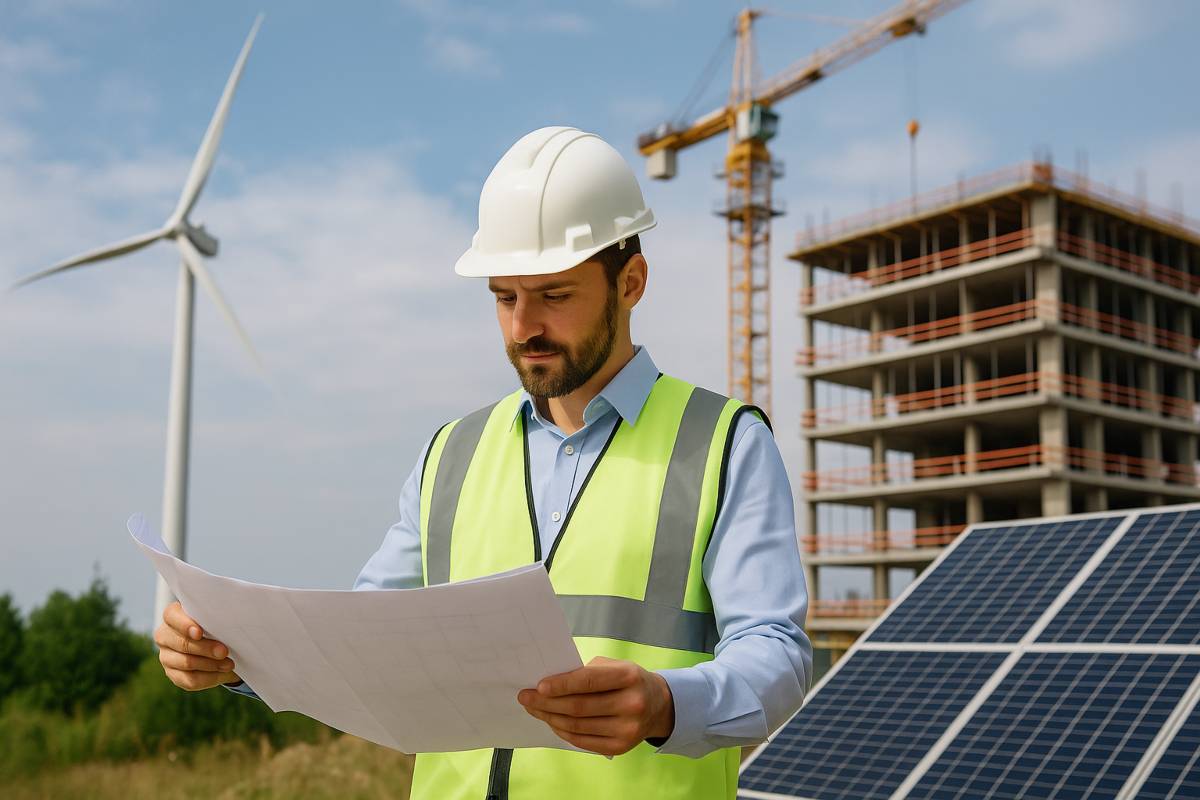
Sustainability Best Practices that Modern Construction Managers Must Adopt
Integrating Green Thinking into Every Phase of Construction Management
In today’s rapidly changing global landscape, construction managers are facing mounting pressure to deliver projects that not only meet time, budget, and quality expectations but also adhere to rigorous sustainability standards. The construction industry is a major contributor to carbon emissions, energy use, and waste generation. Therefore, adopting sustainability best practices is no longer optional—it is a professional imperative. Modern construction managers must be equipped with the knowledge and tools to implement sustainable solutions across the entire project lifecycle.
This shift is driven by environmental regulations, stakeholder expectations, and the long-term benefits of building performance. From material selection and site design to energy efficiency and waste minimization, integrating sustainable practices results in cost savings, enhanced reputation, and improved risk management. Professionals who lead with a sustainability mindset are well-positioned to drive value for their organizations and contribute meaningfully to global climate goals. For those looking to upskill in this domain, enrolling in construction management training courses with a focus on sustainability is a strategic step forward.
Understanding Sustainability in Construction Management
Sustainability in construction involves designing and executing building projects that minimize environmental impact, reduce resource consumption, and promote long-term viability. This means considering not just the structure’s functionality but also its lifecycle impact—from resource extraction and construction processes to operation, maintenance, and eventual demolition.
Modern construction managers are expected to apply a holistic view that integrates environmental, economic, and social considerations. This integrated approach, known as the “triple bottom line,” ensures that construction outcomes deliver value beyond mere financial returns. With evolving green building certifications and sustainability performance indicators, professionals must remain current with best practices and regulatory expectations.
Sustainability-focused sustainability training courses equip professionals with the frameworks and standards—such as LEED, BREEAM, and ISO 14001—that guide responsible construction practices. These tools are critical for modern managers seeking to create environmentally friendly and resource-efficient structures.
Key Sustainability Best Practices for Construction Managers
1. Sustainable Site Selection and Planning
The journey toward sustainable construction begins long before the first brick is laid. Thoughtful site selection and planning can significantly reduce environmental degradation and promote ecological balance. Factors such as minimizing disruption to natural habitats, preserving existing vegetation, and ensuring proper site drainage are critical.
Additionally, construction managers should prioritize urban infill or brownfield redevelopment sites to reduce sprawl and limit the need for new infrastructure. Proximity to public transportation, utilities, and community services also enhances the sustainability of the project.
Taking a proactive approach in the pre-construction phase is a hallmark of effective construction management training courses, which emphasize the importance of long-term impact over short-term gains.
2. Efficient Resource and Materials Management
The construction sector consumes vast quantities of raw materials, many of which are non-renewable. Modern construction managers must prioritize the use of recycled, renewable, or locally sourced materials. Selecting materials with low embodied energy and low volatile organic compound (VOC) emissions can reduce the project’s environmental footprint.
Additionally, using Building Information Modeling (BIM) allows managers to digitally simulate projects and optimize material usage, significantly reducing waste. Inventory control, just-in-time delivery, and proper storage practices also prevent unnecessary material loss.
Professionals can enhance their expertise in this area through targeted sustainability training courses that focus on sustainable procurement and lifecycle analysis.
3. Minimizing Construction Waste
Construction and demolition waste accounts for a large proportion of global landfill content. Implementing a waste management plan from the outset ensures that construction debris is reused, recycled, or disposed of responsibly. Segregating waste on-site, reusing concrete and timber, and donating excess materials are practical ways to minimize landfill impact.
Sustainability-oriented construction management courses emphasize waste auditing and documentation processes, helping managers meet regulatory requirements and enhance accountability.
4. Energy-Efficient Construction Techniques
Reducing energy consumption during construction and in the operational phase of buildings is a key focus of sustainable management. This includes using energy-efficient equipment, optimizing HVAC systems, and incorporating passive design principles such as natural ventilation and solar orientation.
Construction managers must also explore opportunities to integrate renewable energy sources such as solar panels or geothermal systems in their projects. These measures not only reduce emissions but also provide long-term operational cost benefits.
By participating in advanced sustainability courses, professionals gain insights into emerging technologies and energy modeling tools that support energy-efficient decision-making.
5. Water Conservation and Management
Water scarcity is a growing global issue, and construction managers must implement strategies to minimize water usage on-site. Techniques such as rainwater harvesting, greywater reuse, and low-flow fixtures in buildings help reduce water demand.
During construction, dust suppression systems, wheel washing stations, and proper site grading can further limit unnecessary water consumption. Understanding regional water availability and compliance with water management regulations is essential for successful project delivery.
Incorporating water-efficient practices is a common theme in construction management training, equipping managers with actionable knowledge to implement responsible water strategies.
6. Enhancing Indoor Environmental Quality (IEQ)
Beyond energy and water, modern sustainable buildings must support the health and well-being of occupants. High-quality indoor environments feature good air quality, natural lighting, temperature control, and the use of non-toxic materials.
Construction managers must ensure that projects incorporate appropriate ventilation systems, daylighting strategies, and acoustics. Attention to IEQ improves occupant comfort, boosts productivity, and reduces absenteeism—critical outcomes for commercial and institutional buildings.
Through specialized sustainability training courses, professionals can learn how to assess, measure, and improve IEQ performance throughout the construction process.
Leveraging Technology for Sustainable Construction
Technology is playing a transformative role in making sustainable construction more feasible and cost-effective. Construction managers now have access to tools like drones for site monitoring, 3D printing for material efficiency, and digital twins to simulate energy performance.
Furthermore, digital platforms enable seamless collaboration among stakeholders, allowing sustainability goals to be embedded into the project from the beginning. Artificial Intelligence (AI) and Machine Learning (ML) are also being explored to optimize material selection, labor deployment, and supply chain efficiency.
Professionals who want to stay ahead of the curve can explore construction management courses that incorporate these technological advancements into sustainability practices.
The Role of Leadership in Sustainable Construction
Adopting sustainable practices requires more than technical know-how—it demands strong leadership. Construction managers must be able to inspire their teams, align stakeholders around sustainability goals, and foster a culture of continuous improvement.
Effective leaders in this space demonstrate accountability, transparency, and adaptability. They communicate clearly with contractors, clients, and communities to ensure buy-in and compliance. They also champion diversity and inclusion in procurement and hiring, enhancing the social sustainability of their projects.
Managers can develop these leadership skills through practical sustainability training courses, which provide frameworks for stakeholder engagement, ethical decision-making, and long-term visioning.
Overcoming Common Barriers to Sustainable Practices
Despite the clear benefits, construction managers may face obstacles when implementing sustainability initiatives. Common challenges include cost perceptions, resistance to change, lack of knowledge, and regulatory complexities. However, these barriers can be overcome with informed planning and stakeholder collaboration.
Cost remains a major concern, but evidence increasingly shows that sustainable projects deliver higher lifecycle returns. Education and training are key to shifting mindsets, and structured construction management training courses play a vital role in closing the knowledge gap.
Furthermore, aligning sustainability goals with project KPIs and communicating long-term benefits to clients can facilitate broader adoption.
Building a Competitive Advantage Through Sustainability
Construction firms that lead on sustainability gain a significant competitive edge in an increasingly eco-conscious market. Clients, investors, and governments are prioritizing partners who demonstrate environmental responsibility. Green credentials can be a strong differentiator in bids and project proposals.
Moreover, sustainable construction practices contribute to corporate social responsibility goals and help organizations comply with environmental regulations. They also appeal to a younger, sustainability-conscious workforce, enhancing talent acquisition and retention.
Investing in sustainability training courses empowers professionals and organizations to remain compliant, competitive, and forward-thinking in an evolving industry.
Conclusion
Sustainability is no longer a niche focus in construction—it is a defining feature of modern project management. From resource conservation and waste reduction to energy efficiency and occupant well-being, the responsibilities of construction managers now extend well beyond traditional project deliverables.
By adopting these best practices, construction managers not only contribute to a healthier planet but also ensure better project outcomes, reduced risks, and greater stakeholder trust. For professionals seeking to elevate their impact and align with future-ready standards, exploring specialized construction management training courses and sustainability training courses is an essential next step. These courses provide the tools and knowledge to lead with purpose and deliver excellence in every project.





